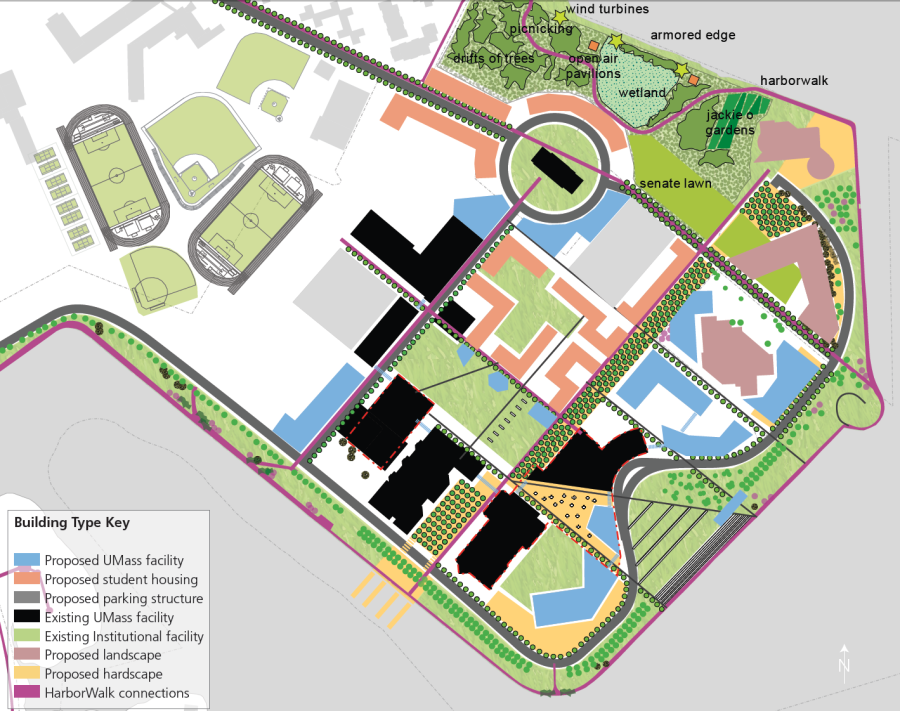NO by Ariel Rodriguez
I fear that sometimes UMass Boston is forgetting exactly what kind of university it’s supposed to be. It’s not BU or Northeastern, it’s UMass Boston – an urban, commuter campus. Its role is to serve a niche market of students looking to further their education. UMass Boston’s role is not to imitate other colleges. But I think the building of the residence halls is just that: an attempt at imitation.
The average age of UMB students is 25. Is anyone 25 and older really going to want to live in a dorm? I’d guess that the majority wouldn’t. Our students have a wide array of lifestyles, and I don’t believe building dorms is an effective way to serve the university as a whole.
On the university’s website, on a page entitled “Building Our Campus,” you can find the following sentence: “With an increase in students in recent years, the university needs the new academic, residential, and parking facilities called for in the master plan.”
We “need” residential facilities? That seems like quite a stretch. I think that everyone who attends and works at this university would agree that we could use more parking, and newer and better buildings. Dorms make the university seem as though it is attempting to serve an indulgence that doesn’t fit the current character of the community.
I have no qualms with the rest of what I’ve seen of the 25-year master plan. UMass Boston’s number one priority should be to create an effective learning environment. That means new academic buildings, repairing and maintaining the ones we have, as well as hiring intelligent, well-qualified faculty. To me, the entire idea of having residency halls is a vain ideal that UMass is trying to meet. Not every college needs dorms. UMass has functioned every semester while increasing the number of enrolled students from year to year, and it has done so without dorms.
The administrators in charge of implementing this “master” plan are either out of touch with what the student body really needs, or are kowtowing to what they think a university needs to have.
YES by Osahh Aim
First of all, with availability of dorms on campus, students will find it a lot easier to participate in extracurricular activities. Instead of having to make a potentially long and tedious journey to attend campus-related activities, students could simply make their way from the dorms.
Another advantage of living in dorms is that they may help improve interpersonal skills. Think about it: even if you end up disliking your roommate, the odds are you’re going to learn to tolerate that person, because you have to live together for at least a year. That sort of experience could come in handy later on in life.
Speaking of personal skills, some time away from home could do wonders for a student’s sense of independence. When living in a dorm with peers, a student must learn how to do a plethora of things for himself in order to survive. What better way to prepare a person for the real world than to thrust him or her into a model version of the world? Dorm life in college would provide a sense of what living in the real world is like – saving money, figuring out all of your own meals, and even doing your own laundry.
A majority of kids dreaming of going to college also dream of enjoying the complete college experience. By the term “college experience,” I mean meeting new people, socializing and breaking free from the shackles of parents. Living at home isn’t really going to help with that, but dorms will. I’m not saying that a lack of dorms makes a university any less complete. I’m just saying that dorms contribute significantly to the acquisition of the complete college experience for students.
Finally, apart from socializing and all that fun stuff, dorm-living is just plain convenient. Instead of having to schlep all the way from Somerville, you can simply roll out of bed thirty minutes before the start of your first class and casually saunter over without being late. Plus, students will be able to save money on buses and gas.
If and when UMass Boston incorporates dorms into the system, I believe an overwhelming majority of the students will be mighty pleased with the development.





















































